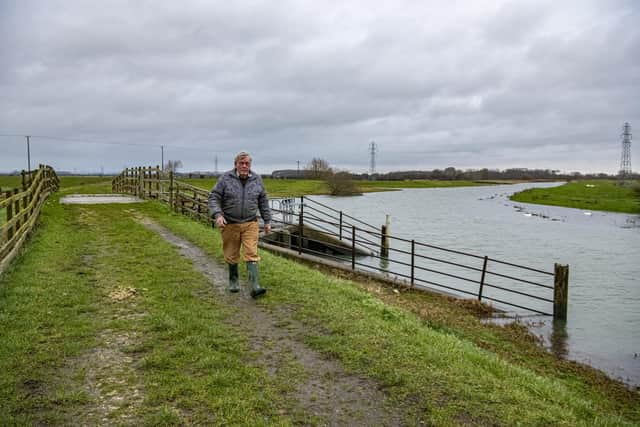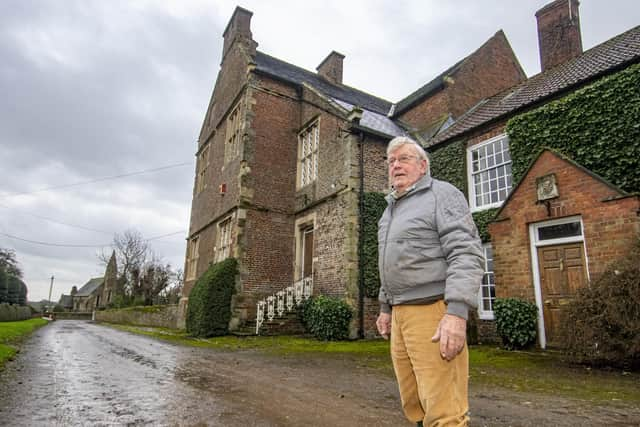Farm of the Week: Wolds tenant farmer whose productive land has been sacrificed to protect Hull from floods
John farms at Beswick Hall. He’s always been more of an arable farmer and works alongside his son Edward on their 550-acre tenanted farm where they also have a Belted Galloway herd. His other son, part of the farm partnership, Roderick is an estate manager in Warwickshire.
John’s recent recognition has been for the voluntary work he has undertaken with the Beverley & North Holderness Internal Drainage Board for over 33 years that saw him vice chairman for 10 years and then chairman of the board for 15 years until 2020. He has also been a prominent voice in the NFU for over 50 years.
Advertisement
Hide AdAdvertisement
Hide Ad“My driving force for better drainage of productive land, is for those who are drainage board levy paying members, because they are getting flooded by what the Environment Agency is doing or not doing.


“I’ve been vociferous in campaigning to get the River Hull to exit water properly, instead of all this flooding we’ve had on farms for half of the years this century.
“Since MAFF (Ministry of Agriculture, Fisheries & Food) became DEFRA and the Environment Agency began they’ve only been reactive planning. There has been no proactive planning to take account of physical run-off, from roads, industry and housing, that comes down very quickly and they keep forgetting about the spring water that comes out of the Wolds.
“It’s not right that these farmers are getting flooded. You can’t put a figure on the overall loss of agricultural production because there are no recorded figures, but it has a real impact on the way we all live. Less land growing crops is less self-sufficiency which leads to higher prices.
Advertisement
Hide AdAdvertisement
Hide Ad“The city of Hull is safe from flooding now because there has been a fortune spent on doing so, but productive agriculural land has not been protected adequately at all.


John was nominated by local MP Graham Stuart, whom he has worked alongside during his time with the internal drainage board but pulls no punches about politicians and how he feels the Environment Agency is ultimately responsible for what he sees as the mess that the drainage has become.
“When George Eustice was in charge of trade agreements for agriculture he would say we are now just a little bit below 80 per cent self-sufficient in what we grow in this country. It is 53 per cent now and going down. Poor drainage is just one aspect, but important. You can’t print what I’d really like to say about politicians.
“The River Hull has gone into dereliction and that does not help the 150 dykes that come under the wing of the Beverley & North Holderness Internal Drainage Board. De-silting of the River Hull is what is needed at pinch-points. When we took a boat out to explain the problem to the Environment Agency we got stuck in the mud beneath Raich Carter Bridge. The Environment Agency told me that it was debris left over from when the bridge was built years ago. That says everything. Nothing has been done since.
Advertisement
Hide AdAdvertisement
Hide Ad“When I was chairman, I took a responsibility for making certain the board did what the Environment Agency weren’t doing and ever since that day the agency has been doing less and less physical work.
“We now spend more money on Environment Agency work than we do on the board’s work and we have 180 miles of dykes to clean out. If we didn’t do that work, we would not be able to get rid of our water because 90 per cent goes out through dykes that the Environment Agency is supposedly responsible for and we would have far more flooding.
“We share a clerk with other local internal drainage boards and we have a full-time engineer who does all the contracts for us as well as for the Environment Agency. How he gets through it all I don’t know, the workload is relentless.
John took on the running of the farm when his father Derrick passed in 1981 having worked alongside him until that time.
Advertisement
Hide AdAdvertisement
Hide Ad“I was just nicely married by then to my dear wife Angela who sadly passed in 2009.
“The biggest change in farming during my lifetime has been labour. There’s far less labour now and far more machinery. We had 15-16 men from around here or Irishmen working at harvest time in the 1950s. I remember driving the first combine that came in 1951.
“When I left college at 19 I came home and drove our first self-propelled combine. It was a Claas Matador. I’ve driven Claas combines ever since, for 62 years. Today, in addition to myself and Edward, we just have two part-time girls.
John is 77 years young and allegedly retired ten years ago but like many more before him he’s still going strong and has embraced new technology while also having expert knowledge of his own crops.
Advertisement
Hide AdAdvertisement
Hide Ad“That’s farming for you. I still handle all the cultivation and combining. When you’re on the combine you can see areas of land that aren’t as good as others without the new technology but I also do all the cross recording on computer.
“Our winter wheat varieties for this year’s harvest are Astronomer, Extase and Typhoon, which is a new one. They are all first wheats and we have 125 acres of them. We have the variety Gleam for second wheat across 20 acres; winter barley across 50 acres; but we have only about 30 acres of oilseed rape of the 60 we initially put in the ground. Flea beetle got the rest. It was just too dry on the strong land for it to get established after the 2022 harvest. Every year is different, dealing with the weather, the climate, it is the farmer’s continual battle. We will also be growing spring beans and vining peas.
“Our land is largely a mix of glacial alluvial drift, marine alluvial and free draining sandy loam.
“Edward runs the livestock enterprises on the farm including the Belted Galloway herd, our duck fattening business on contract for Gressingham and our sheep.
Advertisement
Hide AdAdvertisement
Hide AdThe Duggleby family has farmed in Beswick since the 1600s and always as tenants. John has represented his fellow NFU tenant farmer members as northern representative and at national level.
“I’m passionate about tenant farming. We are tenants to Lord Hotham of Dalton Estate and I have never wanted to own an acre.
“I was chairman of NFU for East Riding County in 1986 and I have been county treasurer for over 30 years.
John is no stranger to awards either. In 2018 he received the Driffield Agricultural Society’s RH Mountifield Award for outstanding contribution to agriculture. He’s a long-standing member of the charity organisation RABI and has been with the Holderness Hunt for over 50 years.
“I’m looking forward to this year’s Dalton Park Point to Point meeting. I remember the first one and I’ll still be there on parking duty this year.